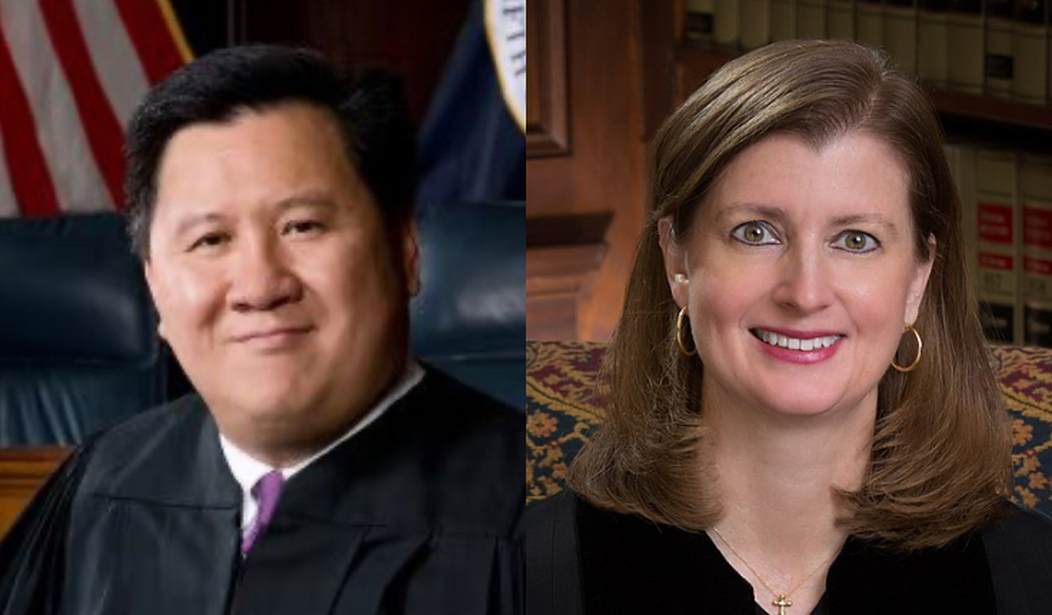Judge James C. Ho of the U.S. Court of Appeals for the Fifth Circuit made news last year when he announced during a speech at the Kentucky Federalist Society that he would no longer hire Yale law school graduates to clerk for him. Joining him in this boycott was Elizabeth Branch, a United States circuit judge of the United States Court of Appeals for the Eleventh Circuit.
Both judges have now added Stanford University to the boycott list after the shameless treatment of another federal judge, Stuart Kyle Duncan, when he was shouted down by students — joined by Tirien Steinbach, the associate dean for diversity, equity, and inclusion, who took to the podium and reportedly stated, “For many people here, your work has caused harm. Is the juice worth the squeeze?”
“We will not hire any student who chooses to attend Stanford Law School in the future,” Ho said, exempting current students as he did with Yale students last year.
NEW: James Ho and Elizabeth Branch, the circuit court judges who announced last year that they would no longer hire clerks from Yale Law, are adding Stanford to the boycott.
The judges won’t hire students who choose to attend Stanford Law in the future.🧵 https://t.co/NQCJj40Oc5
— Aaron Sibarium (@aaronsibarium) April 2, 2023
Though Steinbach is on leave, Stanford has ruled out disciplining the hecklers, who by Stanford’s own admission violated the school’s free speech policy.
“Rules aren’t rules without consequences,” Ho said. “And students who practice intolerance don’t belong in the legal profession.”
Calling the disruption an act of “intellectual terrorism,” Ho argued that Duncan’s treatment reflects “rampant” viewpoint discrimination at elite law schools, some of which do not employ a single center-right professor. It is no coincidence, Ho said, that the worst free speech incidents have occurred at the law schools with the least intellectual diversity. Though Ho did not say what it would take for him to lift the boycott, he implied that a more politically diverse faculty—and a less ideologically uniform administration—would go a long way.
Only the most rabid partisan would disagree with Judge Ho’s analysis of the current state of intellectual diversity on most campuses. But what can be done? Stanford President Marc Tessier-Lavigne and Stanford Law School Dean Jenny Martínez know what the problem is but appear powerless to do anything about it. They wrote a letter of apology to Judge Duncan but appeared clueless about any remedies.
“We are very clear with our students that, given our commitment to free expression, if there are speakers they disagree with, they are welcome to exercise their right to protest but not disrupt the proceedings,” Tessier-Lavigne and Martínez wrote in a letter to Duncan after the protests.
“Staff members who should have enforced university policies failed to do so and instead intervened in inappropriate ways that are not aligned with the university’s commitment to free speech. We are taking steps to ensure that something like this does not happen again,” Tessier-Lavigne and Martínez continued.
You can be “committed” to free speech till the cows come home, but not vigorously enforcing the rules against a tyrannical mob is worse than useless. It should be noted that not a single student was disciplined for their outrageous behavior, and the DEI flunkie who added fuel to the fire during the protest was simply “suspended” — no doubt to be reinstated after the controversy dies down.
Ho is on the right track. The only thing that matters is to hit these young men and women where it hurts — in their future ability to earn money as a lawyer.










Join the conversation as a VIP Member